|
|
|
Sort Order |
|
|
|
Items / Page
|
|
|
|
|
|
|
| Srl | Item |
| 1 |
ID:
142582
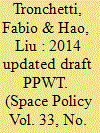

|
|
|
|
|
| Summary/Abstract |
On June 10, 2014, Russia and China presented the updated Draft Treaty on the Prevention of the Placement of Weapons in Space, the Threat or Use of Force Against Space Objects (PPWT) to the Conference on Disarmament. The original 2008 Draft PPWT had been poorly received and criticized, inter alia, for not addressing the most pressing threats to space objects, strategically favoring the interests of its co-sponsors and lacking reliable means of verification.
In presenting the 2014 update the Russian and Chinese representatives pointed out that it had been drafted by taking into account the criticism leveled to its 2008 version and that it should be now viewed as an international effort rather than as a mere Chinese and Russian initiative: they also added that for this reason the amended Draft PPWT constituted a solid instrument to enhance the security of space objects and stood a higher chance of success than its predecessor.
It is, thus worth wondering whether the positive attitude and high expectations of China and Russia towards the amended Draft should be shared or rejected (counteracted, opposed). The present paper gives a rather negative answer to this question. While proceeding to a substantial re-wording and re-organization of its text, the amended Draft maintains the most controversial and debatable aspects of its 2008 version. Therefore, it seems unlikely that delegations within the CD might support it.
Despite its overall negative assessment, the present paper argues that the submission of 2014 updated Draft PPWT may positively contribute, at least indirectly, to the security of space objects. The likely failure of the amended draft could be used by the CD members as an opportunity to focus their efforts in putting in place legal barriers to selected threats to space objects, such as the testing of destructive, debris-generating, ASAT devices. There are elements to believe that a ban on destructive ASAT tests could be achieved and acceptable by the majority of States.
|
|
|
|
|
|
|
|
|
|
|
|
|
|
|
|
| 2 |
ID:
169290


|
|
|
|
|
| Summary/Abstract |
On June 6, 2017, a draft bill entitled the American Space Commerce Free Enterprise Act was introduced to the US House of Representatives. Even though the bill has not been enacted into law yet, its relevance should not be underestimated. Indeed, it not only represents the latest step in regulating the nascent space mining industry but also contains several provisions that, to a large extent, challenges the traditional understanding of basic international space law rules. For example, the draft bill refers to the right of the US entities to engage in space undertaking without conditions or limitations, argues that not all the obligations of the Outer Space Treaty are imputable to those entities, and claims that outer space is not a global commons. In the light of the above, the purpose of the present viewpoint was to review the most innovative, yet controversial, elements of the draft bill and to assess their possible impact on future space resources utilization activities as well as on the overall stability of the space law regime
|
|
|
|
|
|
|
|
|
|
|
|
|
|
|
|
| 3 |
ID:
178851
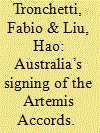

|
|
|
|
|
| Summary/Abstract |
On 15 October 2020, Australia signed the US Artemis Accords. Such a move was heralded as an important step towards promoting the Australian space program and enabling the country to take part in an ambitious space exploration venture. While not denying the importance of such a move, the present commentary analyzes it in a critical manner by assessing its legal and diplomatic implications. Taking into account Australia’s prior membership of the 1979 Moon Agreement and the discrepancies that exists between the Agreement’s provisions and those of the Artemis Accords, the present commentary not only views Australia’s simultaneous membership of both instruments as problematic but also considers it not sustainable in the long term. Based on these considerations, this commentary recommends Australia to either reconsider its membership to the Moon Agreement or, at least, to clarify how the two instruments may co-exists from a legal and political perspective.
|
|
|
|
|
|
|
|
|
|
|
|
|
|
|
|
| 4 |
ID:
126955
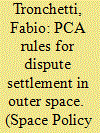

|
|
|
|
|
| Publication |
2013.
|
| Summary/Abstract |
Outer space activities have evolved significantly. While they were previously the exclusive domain of a restricted number of states, now thanks to technological advances and the easing of governmental restrictions, space activities are carried out on a much larger scale and involve subjects of both a governmental and non-governmental nature. Furthermore, the commercial uses of outer space are making space business increasingly profitable and attractive to potential investors. As the economic value of outer space activities, as well as the number of space actors grows, it is nearly inevitable that international disputes related to the use of outer space will occur. Until recently, international space law contained little dedicated machinery to settle international outer space-related disputes. This absence significantly weakened the applicability and enforceability of space law and contributed to a climate of uncertainty. In order to address these issues, the Permanent Court of Arbitration (PCA) adopted the Optional Rules for Arbitration of Disputes Relating to Outer Space Activities on 6 December 2011. The PCA Space Rules represent a significant development in the field of space law because they provide a voluntary and binding dispute settlement method accessible to all space actors and modeled on the specific legal and economic characteristics of space activities. This paper describes the genesis of the PCA Space Rules, assesses their content and innovative character, evaluates their possible implications for the settlement of outer space disputes, and argues that they should be positively received by the outer space community.
|
|
|
|
|
|
|
|
|
|
|
|
|
|
|
|
| 5 |
ID:
106909


|
|
|
|
|
| Publication |
2011.
|
| Summary/Abstract |
Preventing the weaponization of outer space is one of the most relevant issues of the current space law debate. In recent years discussions on this issue have significantly increased in international fora, such as the UN Conference on Disarmament and the COPUOS. While it has not been possible to arrive at an agreed solution on how to efficiently deal with the problem of possible weaponization of outer space so far, several valuable proposals have been put forward. China and Russia, on the one side, and the European Union, on the other, have taken the lead in this respect. While the former have submitted a proposal for a draft treaty on the demilitarization of outer space, known as the PPWT, the latter has issued a Draft Code of Conduct for Outer Space Activities. Despite the differences between the two proposals, this paper proposes the development of a Chinese, Russian and European common approach aimed at preventing the weaponization of outer space. Although such a goal is undoubtedly challenging, some political and legal factors may enable such cooperation in the not-too-distant future.
|
|
|
|
|
|
|
|
|
|
|
|
|
|
|
|
| 6 |
ID:
136882


|
|
|
|
|
| Summary/Abstract |
On June 10, 2014, a bill proposing to establish and protect (private) property rights on asteroid resources was introduced in the US House of Representatives.
Regardless of its effective chances to become law, the presentation of the Bill raises numerous legal questions, particularly concerning the status of extraterrestrial natural resources and the consistency of what the Bill suggests with international space law.
The purpose of the present viewpoint is to address and clarify the above questions.
|
|
|
|
|
|
|
|
|
|
|
|
|
|
|
|
| 7 |
ID:
167515
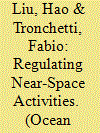

|
|
|
|
|
| Summary/Abstract |
The deployment of high-altitude vehicles in near space with the purpose of providing Internet, communication, and other services represents the new frontier of aerospace activities. Near-space operations are attracting growing interest due to their mult-purpose nature and their anticipated high profitability. Despite such positive perceptions, near-space plans are, however, hampered by the uncertain international legal status of near space. Using the precedent of the exclusive economic zone (EEZ), this article suggests a new categorization of the near space as the exclusive utilization space (EUS) and a set of rules to manage its utilization.
|
|
|
|
|
|
|
|
|
|
|
|
|
|
|
|
| 8 |
ID:
157156
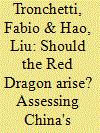

|
|
|
|
|
| Summary/Abstract |
The past couple of years have witnesses one of the most exciting, yet controversial, developments in the field of space law, namely the adoption of domestic laws authorizing the (private) appropriation and utilization of outer space resources. Even though the technology to effectively mine resources in outer space is still under development countries like the United States and Luxembourg have taken this legislative step as a mean to promote the growth of a domestic private space mining sector.
|
|
|
|
|
|
|
|
|
|
|
|
|
|
|
|
| 9 |
ID:
142584
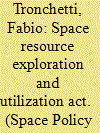

|
|
|
|
|
| Summary/Abstract |
On May 21, 2015, the US House of Representatives passed a revised version of the ASTEROIDS Act, now labeled the Space Resource Exploration ad Utilization Act. If endorsed also by the US Senate the Act may be formally enacted into law by the President of the United States. In the light of this important development it seems appropriate to analyze the content and the legal and political implications of the Space Resource Exploration and Utilization Act.
|
|
|
|
|
|
|
|
|
|
|
|
|
|
|
|
| 10 |
ID:
160946
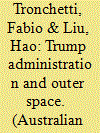

|
|
|
|
|
| Summary/Abstract |
In a relatively short period of time, the Trump administration has been fairly active in the field of space. The reconstitution of the National Space Council, under the direction of Vice President Pence, the President’s signing of Space Policy Directive 1, that calls for the return of humans to the Moon, and the announcement of a National Space Strategy that calls for an ‘America first’ approach in space, have been the highlights of this process. A key component of the administration’s approach has been the promotion of commercial (private) space activities through an effort of regulatory reform intended to facilitate free enterprise and individual initiative in space.
Overall, it is evident that the Trump administration views a consolidated US leadership in space as instrumental to ‘Make America Great Again’. However, due to the lack of cohesion in the management of the US space program, the controversial interpretation of international principles and the US-centred view of space endorsed by the administration, doubts remain as to whether the space policy of the Trump administration will foster US leadership in space or lead to its progressive isolation.
|
|
|
|
|
|
|
|
|
|
|
|
|
|
|
|
|
|
|
|
|